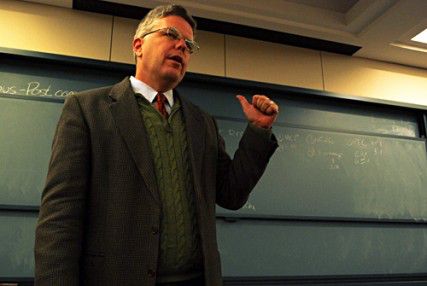
Juliana Schilling, a College of General Studies sophomore, will be voting for the first time this November, but she may not be in the best position to do so. She said she knows little about certain issues such as health care.
“More and more I have to pay for things myself,” Schilling said, “Being in college, I don’t want to have to worry about going to the doctor and paying $400 for antibiotics.”
Schilling was one of 16 students and professors who attended a lecture, led by law professor Kevin Outterson, Tuesday afternoon. Outterson explored the constitutional issues surrounding health care reform, which will appear before the Supreme Court in March.
Outterson, who has filed briefs at the Supreme Court, told students and professors about two major arguments against the constitutionality of the reforms.
One question Outterson posed was whether or not the federal government has the right to use the regulation of interstate commerce to tell Americans they must have insurance.
Outterson said this question deals with the commerce clause, which states the national government can regulate commerce among several states. This power gives Congress the ability to require insurance from U.S. citizens for a monetary fee.
Past precedents set by the Supreme Court have upheld Congress’ right to regulate activity among states, Outterson said. Due to this information, Outterson predicts a seven of nine vote majority in favor of the government on the issue of the commerce clause.
Outterson said that a less publicized and well-known issue could in fact be the downfall of the law, specifically whether or not the federal government can force state officers to take action.
The federal government is assuming the states can take all of the Medicaid expansion or lose all Medicaid programs, Outterson said.
Outterson said he sees this as coercion because the states are in a position where “they can’t really say no.” For coercion charges against the law, Outterson predicts five of nine votes against it.
College of Communication freshman Joe Barto said he was not aware how major the threat to health care reform was.
“I had heard it was brought before the Supreme Court, but I was surprised how strong the constitutional claims against the law were,” Barto said. “It looks like there is a good chance that parts of the bill will fall apart and that would be disastrous.”
Outterson said the conservative members of the Supreme Court will lead the opposition to the law.
“Conservatives have waited a lifetime for this opportunity,” he said.
“What stuck out most to me was the interaction with the conservative court,” said COM sophomore Dyllan Aver-Imm. “I figured there would be more grey area, but he seemed to talk more about the political orientation of the court at this time than whether or not there was actual violation of law.”
Aver-Imm also said he considers the issue something that will affect the country overall rather than him personally.
“It will affect the outcome of how health care is available to those who need it and can’t afford it, but being someone who can afford it I don’t think it will affect me personally,” Aver-Imm said.
Schilling said the seminar helped her start to form her own opinions about the health care issue.
“One of the big things I learned was that it is a good idea, the health care plan, but I can see why it’s really unrealistic in some people’s eyes,” Schilling said. “So I’m really interested in going back and doing my own research to see where my opinions fall.”























































































































